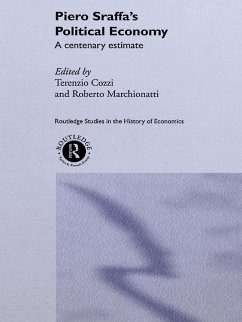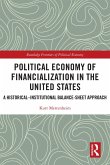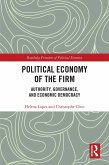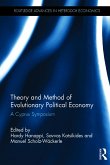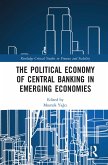Piero Sraffa's Political Economy (eBook, PDF)
A Centenary Estimate
Redaktion: Cozzi, Terenzio; Marchionatti, Roberto
54,95 €
54,95 €
inkl. MwSt.
Sofort per Download lieferbar

27 °P sammeln
54,95 €
Als Download kaufen

54,95 €
inkl. MwSt.
Sofort per Download lieferbar

27 °P sammeln
Jetzt verschenken
Alle Infos zum eBook verschenken
54,95 €
inkl. MwSt.
Sofort per Download lieferbar
Alle Infos zum eBook verschenken

27 °P sammeln
Piero Sraffa's Political Economy (eBook, PDF)
A Centenary Estimate
Redaktion: Cozzi, Terenzio; Marchionatti, Roberto
- Format: PDF
- Merkliste
- Auf die Merkliste
- Bewerten Bewerten
- Teilen
- Produkt teilen
- Produkterinnerung
- Produkterinnerung

Bitte loggen Sie sich zunächst in Ihr Kundenkonto ein oder registrieren Sie sich bei
bücher.de, um das eBook-Abo tolino select nutzen zu können.
Hier können Sie sich einloggen
Hier können Sie sich einloggen
Sie sind bereits eingeloggt. Klicken Sie auf 2. tolino select Abo, um fortzufahren.

Bitte loggen Sie sich zunächst in Ihr Kundenkonto ein oder registrieren Sie sich bei bücher.de, um das eBook-Abo tolino select nutzen zu können.
A century after his birth, this volume presents a re-assessment of the life and work of Piero Sraffa, one of the great economists of the twentieth century.
- Geräte: PC
- mit Kopierschutz
- eBook Hilfe
- Größe: 3.56MB
Andere Kunden interessierten sich auch für
![Piero Sraffa, Unorthodox Economist (1898-1983) (eBook, PDF) Piero Sraffa, Unorthodox Economist (1898-1983) (eBook, PDF)]() Jean-Pierre PotierPiero Sraffa, Unorthodox Economist (1898-1983) (eBook, PDF)54,95 €
Jean-Pierre PotierPiero Sraffa, Unorthodox Economist (1898-1983) (eBook, PDF)54,95 €![Piero Sraffa (eBook, PDF) Piero Sraffa (eBook, PDF)]() Alessandro RoncagliaPiero Sraffa (eBook, PDF)52,95 €
Alessandro RoncagliaPiero Sraffa (eBook, PDF)52,95 €![Marx's Critique of Political Economy Volume One (eBook, PDF) Marx's Critique of Political Economy Volume One (eBook, PDF)]() Allen OakleyMarx's Critique of Political Economy Volume One (eBook, PDF)46,95 €
Allen OakleyMarx's Critique of Political Economy Volume One (eBook, PDF)46,95 €![Political Economy of Financialization in the United States (eBook, PDF) Political Economy of Financialization in the United States (eBook, PDF)]() Kurt MettenheimPolitical Economy of Financialization in the United States (eBook, PDF)42,95 €
Kurt MettenheimPolitical Economy of Financialization in the United States (eBook, PDF)42,95 €![Political Economy of the Firm (eBook, PDF) Political Economy of the Firm (eBook, PDF)]() Helena LopesPolitical Economy of the Firm (eBook, PDF)41,95 €
Helena LopesPolitical Economy of the Firm (eBook, PDF)41,95 €![Theory and Method of Evolutionary Political Economy (eBook, PDF) Theory and Method of Evolutionary Political Economy (eBook, PDF)]() Theory and Method of Evolutionary Political Economy (eBook, PDF)43,95 €
Theory and Method of Evolutionary Political Economy (eBook, PDF)43,95 €![The Political Economy of Central Banking in Emerging Economies (eBook, PDF) The Political Economy of Central Banking in Emerging Economies (eBook, PDF)]() The Political Economy of Central Banking in Emerging Economies (eBook, PDF)50,95 €
The Political Economy of Central Banking in Emerging Economies (eBook, PDF)50,95 €-
-
-
A century after his birth, this volume presents a re-assessment of the life and work of Piero Sraffa, one of the great economists of the twentieth century.
Dieser Download kann aus rechtlichen Gründen nur mit Rechnungsadresse in A, B, BG, CY, CZ, D, DK, EW, E, FIN, F, GR, HR, H, IRL, I, LT, L, LR, M, NL, PL, P, R, S, SLO, SK ausgeliefert werden.
Produktdetails
- Produktdetails
- Verlag: Taylor & Francis eBooks
- Seitenzahl: 456
- Erscheinungstermin: 23. November 2000
- Englisch
- ISBN-13: 9781134592173
- Artikelnr.: 43072612
- Verlag: Taylor & Francis eBooks
- Seitenzahl: 456
- Erscheinungstermin: 23. November 2000
- Englisch
- ISBN-13: 9781134592173
- Artikelnr.: 43072612
- Herstellerkennzeichnung Die Herstellerinformationen sind derzeit nicht verfügbar.
Terenzio Cozzi is Professor of Economics at the University of Torino, Italy. He is also Professor of Money and Finance, Coripe Master of Economics, Torino. He has previously authored Teoria dello sviluppo economico, and Elementi di economia politica: Un testo europeo (with S. Zamagni), and has published essays and articles in the fields of macroeconomics, growth and cycles, and Keynesian economics. Roberto Marchionatti is Professor of Economics at the University of Torino, Italy. His previous publications include Karl Marx Critical Responses and "From Our Correspondent", Luigi Einaudi's Articles in The Economist, 1908-1946, and he has published extensively in the fields of economic theory, industrial economics and history of economic thought.
Introduction, A memoir by Sergio Steve PART I On Sraffa's biography 1 A
child of Cultura Positiva: Turin and the education of Piero Sraffa 2 Piero
Sraffa's early approach to political economy: from the gymnasium to the
beginning of his academic career PART II Sraffa's contribution to the
Cambridge debates in the 1920s and 1930s 3 Sraffa and the criticism of
Marshall in the 1920s 4 Sraffa and Cambridge economics, 1928-1931 5 On some
controversial aspects of Sraffa's theoretical system in the second half of
the 1920s Comments 6 On Marshall's representative firm: a comment on
Marchionatti 7 Why did Sraffa lose interest in imperfect competition? A
comment on Marcuzzo PART III Continuity and change in Sraffa's thought:
from the 1920s to Production of Commodities by Means of Commodities 8
Continuity and change in Sraffa's thought: an archival excursus 9 Some
notes on the Sraffa Papers 10 From the 1925-6 articles to the 1960 book:
some notes on Sraffa's not so implicit methodology 11 Sraffa's edition of
Ricardo's Works: reconstruction of a reconstruction 12 Production of
Commodities by Means of Commodities between criticism and reconstruction:
the given quantities assumption 13 A comment on Salanti and Signorino 14 A
comment on Rosselli 15 A comment on Roncaglia PART IV Specific topics 16
Production of Commodities by Means of Commodities and the open economy 17
Sraffa and the mathematicians: Frank Ramsey and Alister Watson 18 Monetary
analysis in Sraffa's writings 19 On the relationship between Sraffa and
Keynes 20 Sraffa on Hayek: unexpected influences Comments 21 A comment on
Steedman 22 Monetary analyses in Sraffa's writings: a comment on Panico 23
Whatever happened to Dr Hayek after the debate with Mr Sraffa? A comment on
Zappia
child of Cultura Positiva: Turin and the education of Piero Sraffa 2 Piero
Sraffa's early approach to political economy: from the gymnasium to the
beginning of his academic career PART II Sraffa's contribution to the
Cambridge debates in the 1920s and 1930s 3 Sraffa and the criticism of
Marshall in the 1920s 4 Sraffa and Cambridge economics, 1928-1931 5 On some
controversial aspects of Sraffa's theoretical system in the second half of
the 1920s Comments 6 On Marshall's representative firm: a comment on
Marchionatti 7 Why did Sraffa lose interest in imperfect competition? A
comment on Marcuzzo PART III Continuity and change in Sraffa's thought:
from the 1920s to Production of Commodities by Means of Commodities 8
Continuity and change in Sraffa's thought: an archival excursus 9 Some
notes on the Sraffa Papers 10 From the 1925-6 articles to the 1960 book:
some notes on Sraffa's not so implicit methodology 11 Sraffa's edition of
Ricardo's Works: reconstruction of a reconstruction 12 Production of
Commodities by Means of Commodities between criticism and reconstruction:
the given quantities assumption 13 A comment on Salanti and Signorino 14 A
comment on Rosselli 15 A comment on Roncaglia PART IV Specific topics 16
Production of Commodities by Means of Commodities and the open economy 17
Sraffa and the mathematicians: Frank Ramsey and Alister Watson 18 Monetary
analysis in Sraffa's writings 19 On the relationship between Sraffa and
Keynes 20 Sraffa on Hayek: unexpected influences Comments 21 A comment on
Steedman 22 Monetary analyses in Sraffa's writings: a comment on Panico 23
Whatever happened to Dr Hayek after the debate with Mr Sraffa? A comment on
Zappia
Introduction, A memoir by Sergio Steve PART I On Sraffa's biography 1 A
child of Cultura Positiva: Turin and the education of Piero Sraffa 2 Piero
Sraffa's early approach to political economy: from the gymnasium to the
beginning of his academic career PART II Sraffa's contribution to the
Cambridge debates in the 1920s and 1930s 3 Sraffa and the criticism of
Marshall in the 1920s 4 Sraffa and Cambridge economics, 1928-1931 5 On some
controversial aspects of Sraffa's theoretical system in the second half of
the 1920s Comments 6 On Marshall's representative firm: a comment on
Marchionatti 7 Why did Sraffa lose interest in imperfect competition? A
comment on Marcuzzo PART III Continuity and change in Sraffa's thought:
from the 1920s to Production of Commodities by Means of Commodities 8
Continuity and change in Sraffa's thought: an archival excursus 9 Some
notes on the Sraffa Papers 10 From the 1925-6 articles to the 1960 book:
some notes on Sraffa's not so implicit methodology 11 Sraffa's edition of
Ricardo's Works: reconstruction of a reconstruction 12 Production of
Commodities by Means of Commodities between criticism and reconstruction:
the given quantities assumption 13 A comment on Salanti and Signorino 14 A
comment on Rosselli 15 A comment on Roncaglia PART IV Specific topics 16
Production of Commodities by Means of Commodities and the open economy 17
Sraffa and the mathematicians: Frank Ramsey and Alister Watson 18 Monetary
analysis in Sraffa's writings 19 On the relationship between Sraffa and
Keynes 20 Sraffa on Hayek: unexpected influences Comments 21 A comment on
Steedman 22 Monetary analyses in Sraffa's writings: a comment on Panico 23
Whatever happened to Dr Hayek after the debate with Mr Sraffa? A comment on
Zappia
child of Cultura Positiva: Turin and the education of Piero Sraffa 2 Piero
Sraffa's early approach to political economy: from the gymnasium to the
beginning of his academic career PART II Sraffa's contribution to the
Cambridge debates in the 1920s and 1930s 3 Sraffa and the criticism of
Marshall in the 1920s 4 Sraffa and Cambridge economics, 1928-1931 5 On some
controversial aspects of Sraffa's theoretical system in the second half of
the 1920s Comments 6 On Marshall's representative firm: a comment on
Marchionatti 7 Why did Sraffa lose interest in imperfect competition? A
comment on Marcuzzo PART III Continuity and change in Sraffa's thought:
from the 1920s to Production of Commodities by Means of Commodities 8
Continuity and change in Sraffa's thought: an archival excursus 9 Some
notes on the Sraffa Papers 10 From the 1925-6 articles to the 1960 book:
some notes on Sraffa's not so implicit methodology 11 Sraffa's edition of
Ricardo's Works: reconstruction of a reconstruction 12 Production of
Commodities by Means of Commodities between criticism and reconstruction:
the given quantities assumption 13 A comment on Salanti and Signorino 14 A
comment on Rosselli 15 A comment on Roncaglia PART IV Specific topics 16
Production of Commodities by Means of Commodities and the open economy 17
Sraffa and the mathematicians: Frank Ramsey and Alister Watson 18 Monetary
analysis in Sraffa's writings 19 On the relationship between Sraffa and
Keynes 20 Sraffa on Hayek: unexpected influences Comments 21 A comment on
Steedman 22 Monetary analyses in Sraffa's writings: a comment on Panico 23
Whatever happened to Dr Hayek after the debate with Mr Sraffa? A comment on
Zappia
